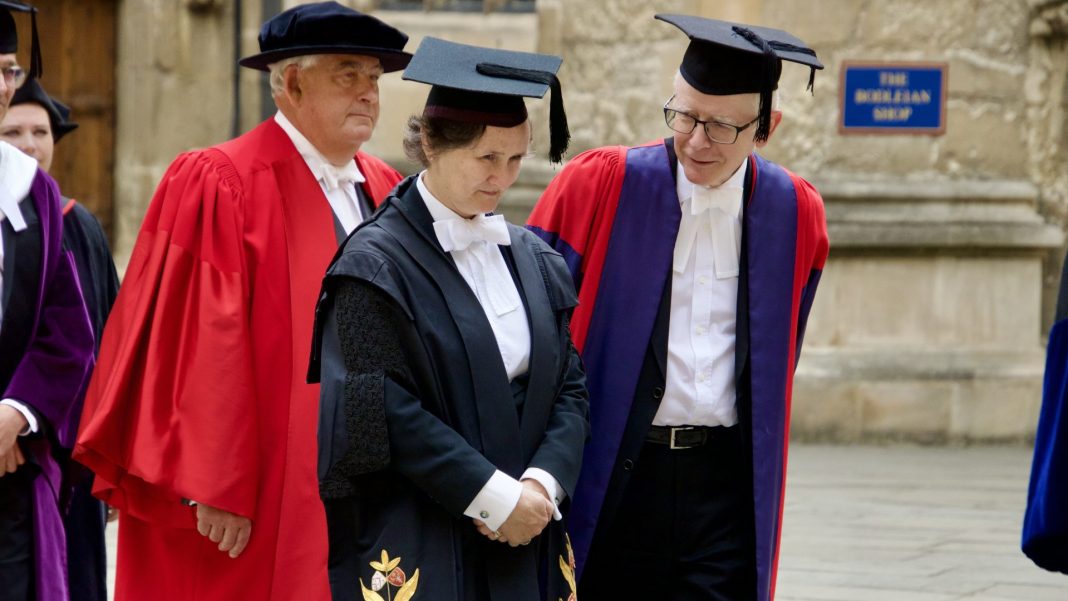The Vice-Chancellor’s annual oration certainly seems like one of those arcane procedures for which Oxford University is renowned. Professor Irene Tracey delivered her speech standing in front of a gilded throne in the Sheldonian Theatre, flanked by academics in mortar boards and suspiciously animal-like capes. Despite its out-of-date presentation, Professor Tracey’s annual address to the University community matters, setting the tone for the coming academic year and sending signals to the wider public about Oxford’s role in British society. A keen marathon runner, she used the tale of Pheidippides as the starting point in a speech centred on the importance of stories. The story of Oxford, according to Tracey, is one of innovation, achievement, and progress but also of hope, truth, and kindness.
However, the oration also made plain the difficulties Tracey will face in selling her story of Oxford. It was hard to miss the glaring contradictions in her speech. Take the several thinly veiled jabs at President Donald Trump. Her pledge to “seek truth, no matter the headwinds” was surely an allusion to the academic climate in America, with the Trump administration threatening several higher-education institutions with reductions to federal spending over what critics say are ideological grievances.
More obviously, Tracey directly challenged Trump’s claim that climate change is a “con job”, asserting the reality of climate change and seeming to dig at the Trump administration’s dubious health claims when saying that “climate change is not caused by paracetamol”. The contrast with her announcement of the new Schwarzman Centre for the Humanities was stark. Stephen A. Schwarzman, the businessman and philanthropist who has given the largest single gift to the University since the Renaissance, is a friend of Trump’s and a Republican megadonor who gave $40 million to Republicans during the 2024 election cycle. This “wonderful addition to our Oxford family” flies in the face of the values Professor Tracey set out in her speech.
The same disconnect is apparent in the most reported-on section of the speech where Tracey sets out Oxford’s commitment to Equality, Diversity, and Inclusion (EDI). Whether or not the Vice-Chancellor’s assertion that “no-one is excluded if you have the smarts” was a reference to the Oxford Union’s embattled President-Elect George Abaraonye as some outlets claimed, the contrast with Schwarzman, whose political beneficiary has spent much of the past year railing against such policies, is striking. The simple platitudes of Professor Tracey’s Oxford story are perhaps not so simple.
The trend continues. The Vice-Chancellor’s pronouncements on freedom of speech are juxtaposed with her announcement of changes to the University’s disciplinary policies, which have been opposed by a number of academics over its new ‘illiberal’ clauses. A commitment to harnessing the power of AI by giving all students access to ChatGPT-5 is confused by blunt messaging on its dangers. A note on “celebrating the humanities” seems like an afterthought next to the lavish praise doled out to the sciences. Perhaps mixed messaging will always be the case when the University hosts, for instance, both a Department of Computer Science committed to innovation and an Institute for Ethics in AI housed in the Philosophy department. But it also suggests there are deeper, more intractable tensions in Oxford’s story.
One story of Oxford that went unmentioned in this year’s oration is that of politics. This has been the ever-present backdrop to Professor Tracey’s first years as Vice-Chancellor. From the controversy over Kathleen Stock’s attendance at a Union debate in her first year to the Gaza encampment and Oxford Action for Palestine protesters occupying her office, politics has dominated the public’s perception of Oxford during her tenure. Unfortunately for Professor Tracey, this has also meant that it has overshadowed much of what Oxford has done well over the past few years.
This is the real point of storytelling in Oxford – politics skews every University announcement. So ubiquitous is Oxford in the public imagination that it occupies two ends of an exaggerated spectrum. On the one hand, a backward institution, clinging on to its traditions (and endowments) like its privileged toffs to their trust funds. On the other, a tragic symbol of a once-great British institution hijacked by radical, left-wing academics interested only in gender studies and “decolonising” curricula. It is not surprising, then, given our polarised political climate, that Professor Tracey’s attempts to avoid ruffling any feathers instead expose deep contradictions.
The real shame is that, under Tracey’s careful if confusing balancing act, there are some important messages that go missing. The fact that Oxford already provides a bursary equivalent to 60% of a full government maintenance grant to one in four undergraduates was news to me, as was the fact that the cost of teaching an undergraduate at Oxford is around £25,000. Whilst the recent tuition fee cap rise strikes many as unfair, students would certainly benefit from knowing the wider financial context facing universities and the generous support Oxford offers. These announcements go largely unnoticed by the student population as the oration takes place before the majority of us have returned to Oxford.
The challenges facing the Vice-Chancellor’s mission to redefine Oxford’s story for a new age are formidable. It seems like the story that Professor Tracey is destined to tell might be less a marathon, more of a tightrope walk.


